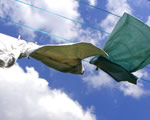 Go to main content
Go to main content
Archive Website of the UK government
Please note that this website has a UK government accesskeys system.
Main menu
Page menu
Environment and greener living

Clothing: greener choices

Making clothes can use a lot of energy and water and cause pollution. Sometimes, people who make clothes work in poor conditions and are not paid a fair price. Make a difference by buying clothes to last, looking for organic and Fairtrade labels and washing clothes at 30 degrees.
Buying clothes
The following tips can help you make greener choices when buying clothes.
Buy clothes to last
Buying clothes to last, rather than lots of clothes that you use a few times and throw away, helps reduce waste, pollution and climate change.
Choose environmentally friendly clothes
You can choose clothes that cause less damage to the environment. For example:
- clothes made from organically grown crops use less harmful pesticides
- clothes made from recycled materials use less energy
- clothes that do not need to be dry cleaned can be a greener choice because dry cleaning often uses harmful chemicals
- clothes with the Oeko-Tex label or EU Ecolabel are produced in a way that reduces damage to the environment
Choose Fairtrade clothes
The FAIRTRADE Mark on clothing guarantees that people who make the clothes have been given a fair price and that workers have been treated fairly. Fairtrade standards also mean that producers have to protect the natural environment, for example by using fewer harmful chemicals.
Finding greener clothes
You can buy organic, Fairtrade and recycled clothing on the high street and online. If you can’t find what you want, or need more information about greener choices, ask retailers. The more people ask, the more shops will think of stocking greener choices.
Washing clothes

Today's detergents wash just as well at 30 degrees
The way you wash and dry your clothes makes a real difference to their environmental impact.
For simple tips on how to save energy when washing, see the link to 'Energy efficient appliances and energy saving tips'.
The article 'Greener ways to clean' explains how using the right amount of laundry product can help protect the environment.
Reuse and recycle old clothes
Keeping clothes in use, rather than throwing them away, can mean less waste and less energy needed to make new clothes. Try:
- buying vintage clothing – classic fashion can be found in all kinds of places, like auction websites, clothes fairs and specialist shops
- passing on unwanted clothes through charity shops, car boot sales or by selling them in online auctions
- repairing clothes rather than throwing them away
- using old clothes for cleaning cloths or fancy dress costumes
Recycling clothes
You can take old clothes to one of 6,000 clothes recycling banks across the country. If you are recycling shoes, make sure you tie pairs together so they don’t get separated.
Useable items will be sold, either through a UK charity shop or overseas. Items not suitable for reuse are made into other products, like padding for mattresses or upholstery.
The wider issue
Making clothes can harm the environment in many ways. For example:
- the energy used contributes to climate change
- the large amounts of water needed (for things like growing cotton) can strain supplies in countries where there is not enough clean drinking water
- 25 per cent of all pesticides used worldwide are for growing cotton
Every year in Britain people buy around 2 million tonnes of clothes and throw away around 1.2 million tonnes. The large amounts involved make all of the environmental problems worse.
Around a fifth of clothes bought in Britain are ‘fast fashion’, low-price clothes that are quickly replaced by new designs. However, producing throw-away clothes cheaply can have its problems. For example:
- low prices can reflect poor working conditions or unfair prices for people making the clothes
- these clothes are often worn only a handful of times and then replaced, leading to more energy being used and more waste
More useful links
Useful contacts
In this section...
- Greener furniture, fittings and flooring
- Electrical goods: greener choices
- Greener ways to clean
- Buying flowers and plants: greener choices
- Buying recycled products
- Food and drink: greener choices
- Water: using less at home
- Greener DIY
- Greener packaging choices
- Choosing 'green' companies
- Shoppers: ways to be greener
- Being greener at home: a quick guide
 Facebook
Facebook Twitter
Twitter StumbleUpon
StumbleUpon Delicious
Delicious Reddit
Reddit
